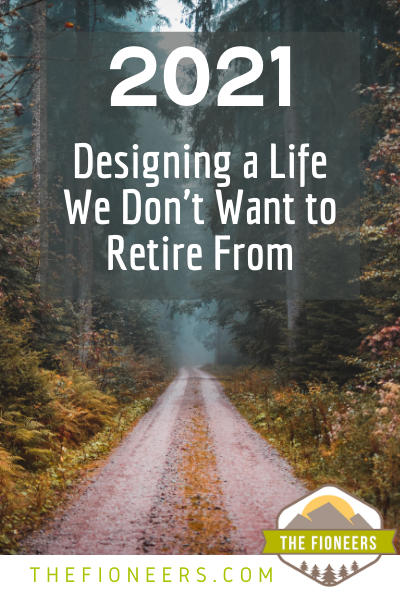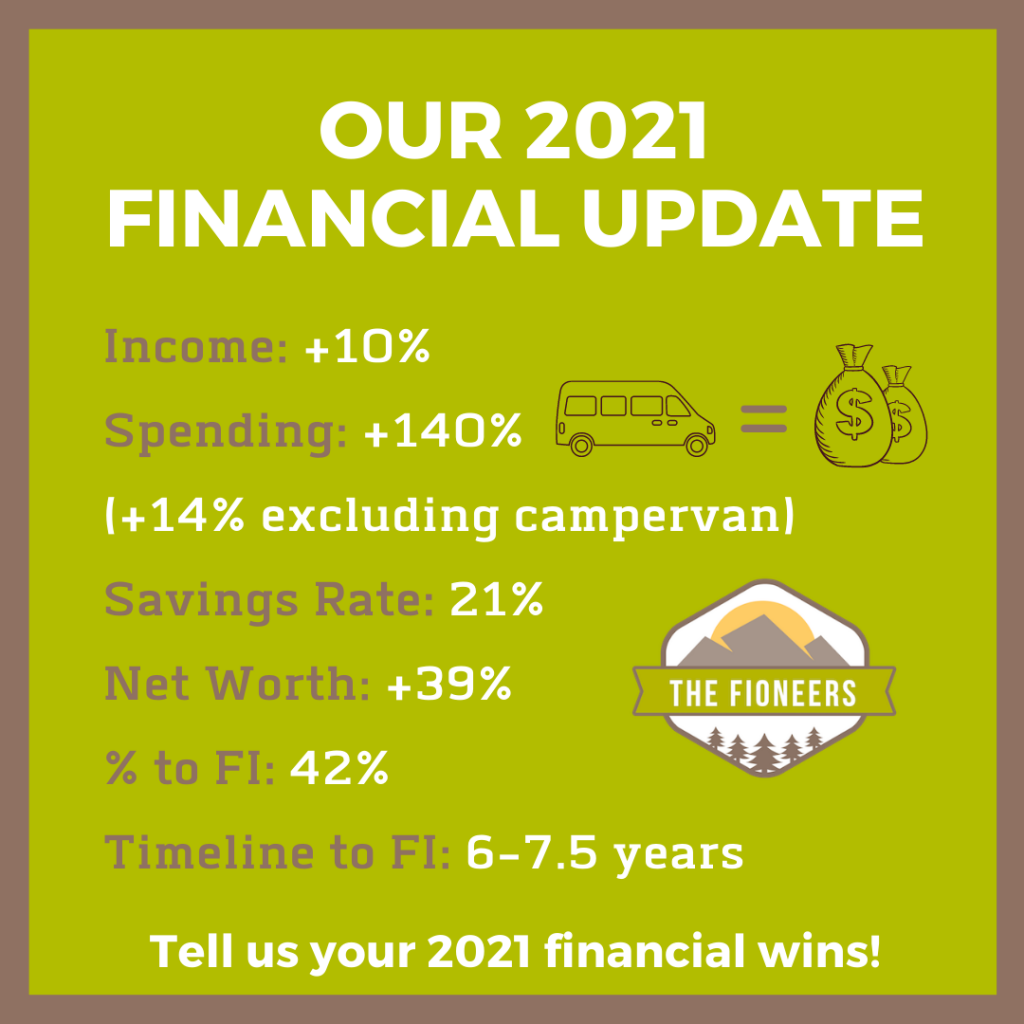

2021 was a big year.
In January, I officially quit my part-time job and because a “full-time” entrepreneur. I put “full-time” in quotes because I don’t actually work full-time hours. On average, I only work about 25 hours/week.
This spring, I partnered with a friend to offer a course called Overcome Your Scarcity Mindset. Do you know how people say that you learn the most from teaching? From experience, I can tell you this is true.
As I created the content for the course, I started to understand the options our financial situation gave us in a new way. We realized we could start making big changes now if we wanted to. Corey could leave his job now if he wanted to! He’s not ready to do that but has a new understanding that he’s working because he wants to (not because he has to).
To be clear, we aren’t FI, but we have passed the Coast FI milestone which means scaling back is completely possible!
This new understanding of freedom allowed us to craft a 5-year plan together as a couple. In this plan we created this spring, Corey was planning to quit his job in either 2023 or 2024. Then, we’d buy and convert a campervan.
Well… things don’t always go as planned. This time it was in a good way!


Just a few months later, we took our campervan adventure around New Hampshire and Maine, and we absolutely LOVED it. Originally, we thought we’d want to do one more vanlife “experiment” in 2022 before buying our own van. We loved the trip so much that we realized we wanted to buy a van now!
Buying and building out a campervan is quite expensive. Well, it will be for us. Some people figure out how to do a budget van build, but we realized that we didn’t need (or want) to. We want a high-quality build that will last us for years.
Making this decision involved a lot of thoughtful conversations around our finances. It took a lot of discussions to get comfortable spending so much money on something that was purely a “want.”
Ultimately, we decided that it was aligned with our values of travel and adventure. It aligned with the location-independent lifestyle we were looking to build. And, in the grand scheme of things, the impact on our FI timeline was minimal and worth it.
To make a long story short, in 2021, we took concrete steps to design a life we don’t want to retire from.
2021 Financial Update
As you might expect, all these decisions impacted our finances in different ways.
We expected our savings rate and income to go down in my first year as an entrepreneur. We were fine with that because we aren’t aiming to retire early anyway. We saw this as a step that would build toward our ideal lifestyle, even if it slowed down our FI timeline.
We also did not expect to buy a van! This was a huge unexpected expense, so I want to share with you how this impacted our overall expenses and timeline this year.
For the purposes of this post, I’m going to split out our everyday expenses from the van expenses. This will allow a meaningful comparison from one year to the next.
Income
As shared above, we were expecting that our income might decrease this year. In January, I quit my job and took the leap to entrepreneurship. While being conservative is often good in planning, we did not expect to be such badasses on the money-making front this year.
Our income in 2021 actually increased by ~10% from 2020!
Corey did receive a raise last year, so the income from his day job increased.
What I’m most proud of, though, is the business income. In 2021, we generated ~8% more income from the business than I made in 2020 from both my day job and the business combined!
For some reason, I feel way more proud of this than I ever did about receiving a raise or promotion at work!
Expenses
Our expenses were also significantly different than last year. The biggest driver of the change was the costs associated with the campervan. But, I want to split out those costs to share the changes in our everyday expenses also.
In 2021, we spent ~140% more than we did in 2020! Wow, that’s a lot!
The good thing is that the vast majority of that increase was from the van expenses. Without including costs related to the van, we increased our everyday expenses by about 14%.
To be clear, this is a significant increase in our everyday spending. So, I decided to comb through our expenses in Personal Capital. This allowed me to see what was different in our spending from 2020 to 2021.
Here are the things that contributed to the increased expenses:
- Mortgage: In 2020, we refinanced our mortgage. Because of the timing, we only needed to pay 11 months of the mortgage during 2020. In 2021, we were back on a regular schedule and paid for the full 12 months.
- Restaurants: We doubled our restaurant spending from about $2K to $4K. To be clear, most of this was expected and intentional. Since receiving a stimulus check this year, we decided to order take-out from local restaurants at least once/week. This allowed us to spend our stimulus money in a way that supported our local economy. We also purchased about a case and a half of wine from wineries when we went to Napa in November. Wineries fell into restaurant spending since we don’t have a separate category for alcohol.
- Healthcare/Medical: What we spent on healthcare and medical more than doubled (from ~$2,000 to ~$5,000). The vast majority of this increase comes from me (although Corey did get some dental work done this year). I decided it was time to double down on some health issues. I met my insurance deductible and the out-of-pocket maximum for various reasons. And, I decided to invest in additional treatments that were not covered by insurance, including acupuncture, nutrition coaching, specialized physical therapy, and massage. This investment into my health was completely worth it.
- Travel: We spend ~$1,000 more on travel in 2021 than we did in 2020. This makes a lot of sense considering we did not travel much early in the pandemic. The campervan rental that we did this summer we also more expensive than we expected. The cost almost discouraged us from renting the van. I’m so glad we decided that it would be worth it!
Savings Rate
Because of the huge change in our expenses this year, we also saw a huge change in our savings rate. Last year (2020), we were able to save 63% of our income! This felt super crazy to us because I was still working part-time. A large driver of this was that we also had started to generate income from the business!
If you are pursuing financial independence, your savings rate is one of the most important metrics to track. This will help you assess how long it will take you to reach FI and other milestones like Coast FI and Semi-Retirement.
In 2021, our savings rate decreased significantly to…


21%!
Your savings rate includes two important metrics – income and expenses. We increased our income slightly and increased our expenses dramatically.
Because of this, our savings rate fell from 63% to 21%. To be honest, we don’t mind much because the campervan helps us build a life we don’t want to retire from.
If we had not bought the campervan (and sent all that money to savings instead), we would have saved 63% of our income. Our savings rate would have been exactly the same as 2020.
We’d have moved a lot closer to our FI date. But, we would not have made such a huge decision to improve our lives. It was worth it.
Net Worth
Between January 1st of 2021 and today, our net worth has increased by ~39%!
Since our savings rate decreased significantly, the vast majority of this increase came from stock market gains. All our investments are currently in index funds that track the performance of the overall stock market. As I’m writing this, the YTD return for the S&P500 is ~25%. This means our net worth has outpaced the market because of additional savings and our increased home value.
We don’t set any goals around our net worth because there is so much of it that is outside of our control. We like to use it as an indicator of wealth over time. We simply want to see it moving in the right direction since we are still in the accumulation phase.
Invested Assets as a % of our full FI target
We define financial independence as having 25-33 times your annual expenses in your investments. Reaching this milestone would allow you to safely withdraw 3-4% of your portfolio each year in retirement without depleting the balance.
Last year we had about 9 times our annual expenses, which came out to be about 37% of the way to our full FI target. This year, we have about 10 times our annual expenses. This means that we are about 42% of the way to our full FI target.
You might have expected this to increase more. I’ll share more below about why it didn’t.
Timeline to Reach Financial Independence
To be honest, this metric is getting a lot less important to us as we continue to design our ideal life. But, it is a fun way to gamify the process and use it as motivation to continue to slow down.
To be clear, this metric is the timeline it would take us to reach FI if we kept everything the same (excluding the cost of van build). We don’t plan to keep everything the same, so this is simply a thought exercise.
Last year, our timeline to reach FI was 6-7.5 years. This would put us on track to reach FI somewhere between the age of 39-41.
This year, our timeline to reach FI is still 6-7.5 years! This would put us on track to reach FI somewhere between the age of 40-42.
This means that our FI timeline actually lengthened by one year. This happened for two reasons:
- We spent A LOT of money on our van. We predicted that spending the money would increase our FI timeline by about 10 months.
- We also decided to increase our FI number to more accurately reflect likely health insurance costs once neither of us is working for an employer.
We are totally fine with seeing our FI timeline lengthen. In fact, I’m feeling a little bit giddy seeing that it’s getting longer. All the changes we’ve made up to this point (taking time off to focus on my health, going back to work part-time, etc.) didn’t actually have much of an impact on our FI timeline.
Now, we’re getting deeper into building a life we don’t want to retire from, and our timeline is lengthening by design.
We’ve already reached Coast FI, so we know that scaling back will not jeopardize having a comfortable traditional retirement.
Over the next few years, we will continue to make decisions that will lengthen our timeline. In 2022, we will also have some van build expenses (although not as many as this year). In 2023, we’ll likely reduce our income significantly if/when Corey quits his job.
We’re okay with reducing our savings rate and lengthening our timeline to reach FI as long as it’s intentional.


We Learned So Much in 2021
Every year, we learn new things about our finances and what we want our lives to look like.
Here are just a few of the key things we learned this year:
- We learned to look at financial metrics in a way that would support us in designing lives we don’t want to retire from.
- This allowed us to start planning for some even bigger changes over the next few years, including Corey leaving traditional work and buying our campervan!
- Learning to spend money on the things we value most: health, adventure, and quality time with friends and family.
What did you learn in 2021?

























Congrats on a successful year. I love the title of the post and the pursuit of designing a life that you don’t want to retire from. That is THE goal. FIRE or not, if you do things you love doing that give you energy and joy, that is the ultimate destination to steer your life. Keep up the good work. Cheers!
Thank you!
I loved this post! Super meaningful and well written. I’m so proud and happy for you that you earned 8% more from your business alone than from your business and work combined in the previous year!
That’s truly the dream 🙂
Hey! I had no idea that you had a blog. I just read your limiting beliefs post.
Thank you so much for the note. 🙂 I am proud of myself too. It’s so crazy! ?
Best,
Jess